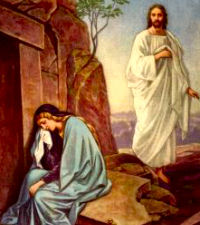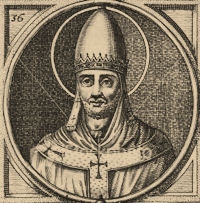Collect: Almighty and ever-living God, your Spirit made us your children, confident to call you Father. Increase your Spirit of love within us and bring us to our promised inheritance. Grant this through our Lord Jesus Christ, your Son, who lives and reigns with you and the Holy Spirit, one God for ever and ever. Historically today is the feast of St. Julius, a Roman who was chosen Pope on the 6th of February in 337. He ruled the Church until 352 and received the appeal from St. Athanasius, whom he defended against his Arian accusers. The letter he wrote to the East on this occasion is one of the most momentous pronouncements of the Roman See. He built several churches in Rome and ranks as one of the most distinguished occupants of the Holy See.
St. Julius I The man who was compelled to face the problem was Julius, a Roman who had been chosen to succeed Mark after an unexplained interval of four months. He soon received delegates from Alexandria asking him to acknowledge a certain Pistus as bishop of Alexandria in place of Athanasius, the mighty fighter for orthodoxy. The delegates tried to prove that Athanasius, who actually had been the victim of Arian intrigue, had been validly deposed. Athanasius on his part also sent envoys and later came to Rome in person to plead his case before the Pope. The Arians asked Julius to hold a synod to decide the case, but when in 341 Julius actually did convene it, they refused to attend. The Pope held it without them and over fifty bishops decreed that Athanasius had been unjustly condemned. Julius informed the Arians at Alexandria of this decision and let them know that he was displeased at their uncooperative attitude. The Emperor Constans, who ruled in the West, was favorable to the orthodox Christians while his brother Constantius, who ruled the East, was pro Arian. At this time both Emperors agreed to hold a big general council to see if religious unity could be achieved. Pope Julius approved of the plan and sent legates to Sardica, the modern Sofia, where the council gathered. The council did not achieve religious unity because the Arians, when they found themselves outnumbered, walked out. The council once again vindicated Athanasius and once more repeated the solemn Nicene Creed. It also left an interesting set of regulations on the manner in which appeals to the pope should be made. In spite of the repeated vindications of Athanasius, that good man was unable to return to his see. Emperor Constans supported the Arian George until the usurper died. Then and only then was the long-suffering Athanasius allowed to go home. Pope Julius, delighted, wrote a letter to the people of Alexandria, congratulating them on the return of their true bishop. At Rome the number of Christians continued to grow during the pontificate of Julius. He built two new basilicas and three cemetery churches. The stay of St. Athanasius at Rome helped to popularize Egyptian monasticism and gave an impetus to religious life there. Pope St. Julius died April 12, 352. He was buried in the Cemetery of Calepodius. His feast is kept on April 12. Excerpted from Popes Through the Ages by Joseph Brusher
Daily Readings for: April 12, 2010
(Readings on USCCB website)
ACTIVITIES
PRAYERS
 12th
12th Monday of the Second Week of Easter Old Calendar: Julius I, pope (Hist)
 With Pope St. Julius the Papacy finds at its doorstep the vexing problem of the Eastern Arians. It is true that the Council of Nicaea had condemned Arianism, but in spite of that Arians had been growing in strength and had even gained the ear of Constantine, and what was more crucial, that of his son Constantius who succeeded him in the East.
With Pope St. Julius the Papacy finds at its doorstep the vexing problem of the Eastern Arians. It is true that the Council of Nicaea had condemned Arianism, but in spite of that Arians had been growing in strength and had even gained the ear of Constantine, and what was more crucial, that of his son Constantius who succeeded him in the East.